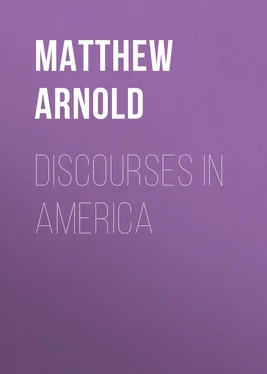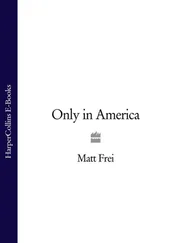Matthew Arnold - Discourses in America
Здесь есть возможность читать онлайн «Matthew Arnold - Discourses in America» — ознакомительный отрывок электронной книги совершенно бесплатно, а после прочтения отрывка купить полную версию. В некоторых случаях можно слушать аудио, скачать через торрент в формате fb2 и присутствует краткое содержание. Жанр: foreign_antique, foreign_prose, на английском языке. Описание произведения, (предисловие) а так же отзывы посетителей доступны на портале библиотеки ЛибКат.
- Название:Discourses in America
- Автор:
- Жанр:
- Год:неизвестен
- ISBN:нет данных
- Рейтинг книги:4 / 5. Голосов: 1
-
Избранное:Добавить в избранное
- Отзывы:
-
Ваша оценка:
- 80
- 1
- 2
- 3
- 4
- 5
Discourses in America: краткое содержание, описание и аннотация
Предлагаем к чтению аннотацию, описание, краткое содержание или предисловие (зависит от того, что написал сам автор книги «Discourses in America»). Если вы не нашли необходимую информацию о книге — напишите в комментариях, мы постараемся отыскать её.
Discourses in America — читать онлайн ознакомительный отрывок
Ниже представлен текст книги, разбитый по страницам. Система сохранения места последней прочитанной страницы, позволяет с удобством читать онлайн бесплатно книгу «Discourses in America», без необходимости каждый раз заново искать на чём Вы остановились. Поставьте закладку, и сможете в любой момент перейти на страницу, на которой закончили чтение.
Интервал:
Закладка:
Isaiah, however, does not make his remnant confine itself, like Plato’s, to standing aside under a wall during this life and then departing in mild temper and good hope when the time for departure comes; Isaiah’s remnant saves the State. Undoubtedly he means to represent it as doing so. Undoubtedly he imagines his Prince of the house of David who is to be born within a year’s time, his royal and victorious Immanuel, he imagines him witnessing as a child the chastisement of Ephraim and the extirpation of the bad majority there; then witnessing as a youth the chastisement of Judah and the extirpation of the bad majority there also; but finally, in mature life, reigning over a State renewed, preserved, and enlarged, a greater and happier kingdom of the chosen people.
Undoubtedly Isaiah conceives his remnant in this wise; undoubtedly he imagined for it a part which, in strict truth, it did not play, and could not play. So manifest was the non-fulfilment of his prophecy, taken strictly, that ardent souls feeding upon his words had to wrest them from their natural meaning, and to say that Isaiah directly meant something which he did not directly mean. Isaiah, like Plato, with inspired insight foresaw that the world before his eyes, the world of actual life, the State and city of the unsound majority, could not stand. Unlike Plato, Isaiah announced with faith and joy a leader and a remnant certain to supersede them. But he put the leader’s coming, and he put the success of the leader’s and the remnant’s work, far, far too soon; and his conception, in this respect, is fantastic. Plato betook himself for the bringing in of righteousness to a visionary republic in the clouds; Isaiah, – and it is the immortal glory of him and of his race to have done so, – brought it in upon earth. But Immanuel and his reign, for the eighth century before Christ, were fantastic. For the kingdom of Judah they were fantastic. Immanuel and the remnant could not come to reign under the conditions there and then offered to them; the thing was impossible.
The reason of the impossibility is quite simple. The scale of things, in petty States like Judah and Athens, is too small; the numbers are too scanty. Admit that for the world, as we hitherto know it, what the philosophers and prophets say is true: that the majority are unsound. Even in communities with exceptional gifts, even in the Jewish State, the Athenian State, the majority are unsound. But there is ‘the remnant.’ Now the important thing, as regards States such as Judah and Athens, is not that the remnant bears but a small proportion to the majority; the remnant always bears a small proportion to the majority. The grave things for States like Judah and Athens is, that the remnant must in positive bulk be so small, and therefore so powerless for reform. To be a voice outside the State, speaking to mankind or to the future, perhaps shaking the actual State to pieces in doing so, one man will suffice. But to reform the State in order to save it, to preserve it by changing it, a body of workers is needed as well as a leader; – a considerable body of workers, placed at many points, and operating in many directions. This considerable body of workers for good is what is wanting in petty States such as were Athens and Judah. It is said that the Athenian State had in all but 350,000 inhabitants. It is calculated that the population of the kingdom of Judah did not exceed a million and a quarter. The scale of things, I say, is here too small, the numbers are too scanty, to give us a remnant capable of saving and perpetuating the community. The remnant, in these cases, may influence the world and the future, may transcend the State and survive it; but it cannot possibly transform the State and perpetuate the State: for such a work it is numerically too feeble.
Plato saw the impossibility. Isaiah refused to accept it, but facts were too strong for him. The Jewish State could not be renewed and saved, and he was wrong in thinking that it could. And therefore I call his grand point this other, where he was altogether right: that the actual world of the unsound majority, though it fancied itself solid, and though most men might call it solid, could not stand. Let us read him again and again, until we fix in our minds this true conviction of his, to edify us whenever we see such a world existing: his indestructible conviction that such a world, with its prosperities, idolatries, oppression, luxury, pleasures, drunkards, careless women, governing classes, systems of policy, strong alliances, shall come to nought and pass away; that nothing can save it. Let us do homage, also, to his indestructible conviction that States are saved by their righteous remnant, however clearly we may at the same time recognise that his own building on this conviction was premature.
That, however, matters to us little. For how different is the scale of things in the modern States to which we belong, how far greater are the numbers! It is impossible to overrate the importance of the new element introduced into our calculations by increasing the size of the remnant. And in our great modern States, where the scale of things is so large, it does seem as if the remnant might be so increased as to become an actual power, even though the majority be unsound. Then the lover of wisdom may come out from under his wall, the lover of goodness will not be alone among the wild beasts. To enable the remnant to succeed, a large strengthening of its numbers is everything.
Here is good hope for us, not only, as for Plato’s recluse, in departing this life, but while we live and work in it. Only, before we dwell too much on this hope, it is advisable to make sure that we have earned the right to entertain it. We have earned the right to entertain it, only when we are at one with the philosophers and prophets in their conviction respecting the world which now is, the world of the unsound majority; when we feel what they mean, and when we go thoroughly along with them in it. Most of us, as I have said already, would by no means have been with them when they were here in life, and most of us are not really with them now. What is saving? Our institutions, says an American; the British Constitution, says an Englishman; the civilising mission of France, says a Frenchman. But Plato and the sages, when they are asked what is saving, answer: ‘To love righteousness, and to be convinced of the unprofitableness of iniquity.’ And Isaiah and the prophets, when they are asked the same question, answer to just the same effect: that what is saving is to ‘order one’s conversation right’; to ‘cease to do evil’; to ‘delight in the law of the Eternal’; and to ‘make one’s study in it all day long.’
The worst of it is, that this loving of righteousness and this delighting in the law of the Eternal sound rather vague to us. Not that they are vague really; indeed, they are less vague than American institutions, or the British Constitution, or the civilising mission of France. But the phrases sound vague because of the quantity of matters they cover. The thing is to have a brief but adequate enumeration of these matters. The New Testament tells us how righteousness is composed. In England and America we have been brought up in familiarity with the New Testament. And so, before Mr. Bradlaugh on our side of the water, and the Congress of American Freethinkers on yours, banish it from our education and memory, let us take from the New Testament a text showing what it is that both Plato and the prophets mean when they tell us that we ought to love righteousness and to make our study in the law of the Eternal, but that the unsound majority do nothing of the kind. A score of texts offer themselves in a moment. Here is one which will serve very well: ‘Whatsoever things are true, whatsoever things are elevated, whatsoever things are just, whatsoever things are pure, whatsoever things are amiable, whatsoever things are of good report; if there be any virtue, and if there be any praise; have these in your mind, let your thoughts run upon these.’ 1 1 Philippians , iv, 8.
That is what both Plato and the prophets mean by loving righteousness, and making one’s study in the law of the Eternal.
Интервал:
Закладка:
Похожие книги на «Discourses in America»
Представляем Вашему вниманию похожие книги на «Discourses in America» списком для выбора. Мы отобрали схожую по названию и смыслу литературу в надежде предоставить читателям больше вариантов отыскать новые, интересные, ещё непрочитанные произведения.
Обсуждение, отзывы о книге «Discourses in America» и просто собственные мнения читателей. Оставьте ваши комментарии, напишите, что Вы думаете о произведении, его смысле или главных героях. Укажите что конкретно понравилось, а что нет, и почему Вы так считаете.












